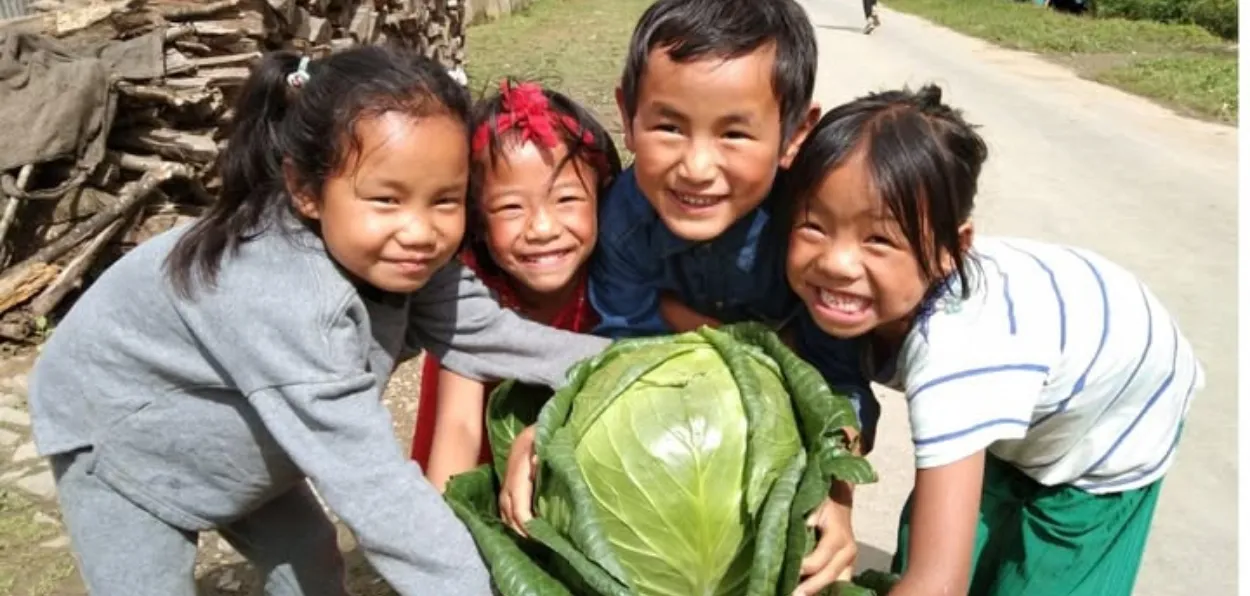
Senapati (Manipur)
Recently a picture of cherubic children holding a giant cabbage clicked in the remote Liyai Chilao Village in the Senapati district of Manipur had attracted people’s attention to this region’s agriculture.
World Environment Day
#WATCH | Manipur Youth champion organic farming revolution, boosting floriculture and fruit cultivation. pic.twitter.com/rF7NULFVpG
— ANI (@ANI) June 5, 2025
A peaceful and beautiful village, Zhaimai village (officially known as Liyai) is considered the biggest village amongst the Poumai Naga villages of Manipur. The picture clicked by R K Paul Chawang went viral on social media as it showed the enterprise of local farmers - the cabbage in the picture weighs a whopping 7.5 kilos.
Cabbage weights generally range from 500 to 1,000 grams (1 to 2 lb). What makes the gigantic cabbage even more special is that it was reportedly grown by using traditional methods.
At a time when naturally grown green and leafy vegetables have become an oddity, this picture holds hope for the future.
After this picture, it comes out that In the lush hills of Senapati district, a quiet revolution in organic farming is taking root, led by determined farmers and young visionaries. With its cool climate and rich biodiversity, Manipur is emerging as a model state for sustainable agriculture, especially in floriculture and organic fruit farming.

A local Manipuri with a giant cabbage grown in his organic farm
At the heart of this movement is 28-year-old Chokhone, a dynamic entrepreneur from Mao, whose efforts have turned the region into a flourishing hub of dried flower cultivation. "We have around seven to eight hundred dedicated farmers growing flowers across various villages in the Mao area. Our dried flowers are now sold in 17 states across India," she said.
Known as the 'Land of Flowers', Mao blooms with cosmos, orchids, strawflowers, and irises. Local farmers, many of them women, are capitalising on the growing demand for decorative and medicinal flowers. One such farmer, Kaini, proudly held up a bunch of vibrant statice blooms. "They come in different colours. A bunch sells for one hundred rupees, highlighting the direct benefits to rural households," she said.
The floriculture venture has not only brought economic prosperity but also created significant employment opportunities, transforming once-subsistence farming into profitable green enterprises.
Meanwhile, over 150 km away, another inspiring story is unfolding at Manipur University.
A team of eleven students, driven by a shared vision for sustainability, launched an organic watermelon farm using fully natural methods. "We started after getting permission from the Vice Chancellor," said Laishram Chandramani, a student leader. "It only takes 120 days to harvest, and we can earn a good income."
This youthful initiative stands as a beacon of innovation and eco-conscious enterprise. Together, the success stories from Senapati and Imphal underscore Manipur's commitment to a healthier, greener future through organic farming, one flower and fruit at a time.
Going back to the giant cabbage story, the heaviest cabbage weighed 62.71 kg (138.25 lb) and was presented at the Alaska State Fair by Scott A. Robb (USA) in Palmer, Alaska, USA, on 31 August 2012.
The picture was posted on the popular Facebook page 'Naga Hills' where it has accrued over 65,000 likes and 1,000 shares. As expected, netizens have expressed their awe at this giant cabbage. Many social media users hailed the organic farming practices in the Northeast Indian region.
ALSO READ: Islamic Morocco bans animal slaughter on Eid in view of drought
Reacting to the picture, Ramesh Nambiar, a Facebook user, wrote, "I think a Northeast Ministry for organic vegetables/fruits/bamboo etc has to be set up and marketed professionally to the international market. Farmer to the customer without middlemen."
